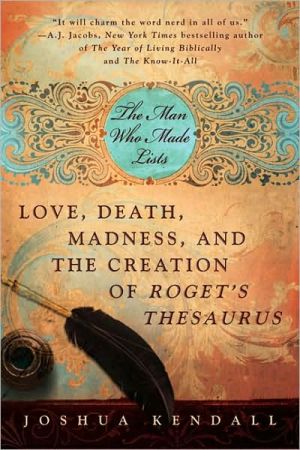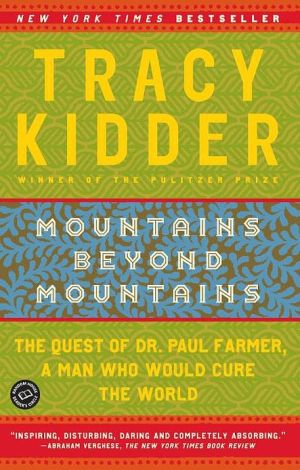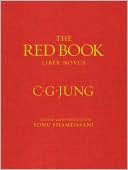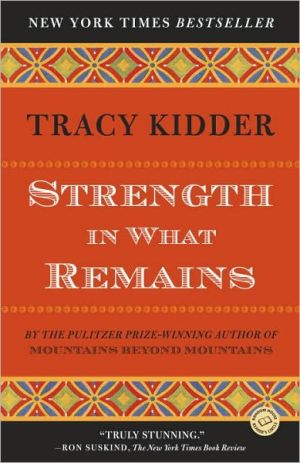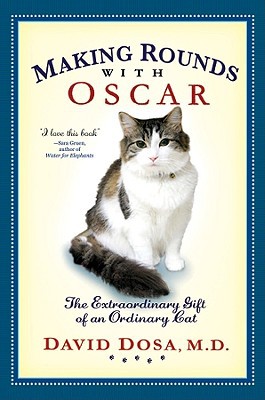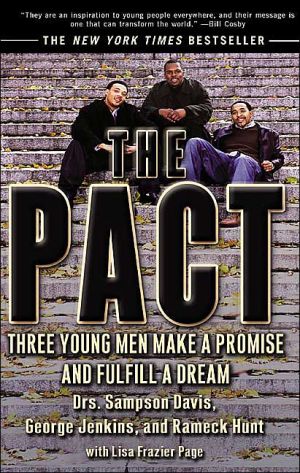The Man Who Made Lists: Love, Death, Madness, and the Creation of Roget's Thesaurus
Peter Mark Roget-polymath, eccentric, and synonym aficionado-was a complicated man. He was an eminent scholar who absorbed himself in his work, yet he also possessed an allure that endeared him to his mentors and colleagues-not to mention a host of female admirers. But, most notably, Roget made lists.From the age of eight, Roget kept these lists with the intention of ordering the chaotic world around him. After his father's death, his mother became overbearing and despondent. Soon, his sister...
Search in google:
Award-winning journalist Joshua Kendall presents the extraordinary true story of Peter Mark Roget and his legendary thesaurus. The Barnes & Noble Review Apart from Webster, few people have had more impact on English syntax than Peter Roget. At this very moment, tattered copies of Roget's International Thesaurus are sitting on the desks of thousands of writers, but how many know the story of the man behind the words? In his biography of Roget, Joshua Kendall shows how the indispensible reference book -- which first rolled off British presses in 1852 -- sprang from the mind of an obsessive-compulsive. Modern psychoanalysts would have a field day with Roget's upbringing by a domineering mother and his family history of insanity and suicide. Kendall's biography opens with a dramatic, and very bloody, scene: Roget's uncle commits suicide by slitting his throat, then dies in the arms of Roget, a successful doctor at the time. The account of Roget's life that follows never quite achieves that level of intensity -- though Kendall tries to hold our interest with scenes where he appears to have invented dialogue (or patched it haphazardly from diverse extant sources), with artificial, stilted results. Some of the difficulty might lie with Roget himself, who led a repressed, controlled life. In addition to synonyms and antonyms, his other lists charted his personal life through "Dates of Deaths" and "List of Principal Events." The lifelong annotations provided an emotional haven for the shy, awkward man. "He became a daydreamer who easily got lost in the contents of his own mind," Kendall writes. Creating the thesaurus was "both a moral calling and a welcome distraction from his turbulent inner world." More than a wordsmith, Roget also invented a user-friendly slide rule, had breakthrough discoveries in the science of optics (which Kendall links to the invention of motion pictures), and participated in early experiments with laughing gas. However, his legacy remains the thesaurus, and that impact continues right up to this moment, when someone, somewhere is searching for just the right word. --David Abrams
Preface 1Prologue: Stained by the Blood of a National Hero 9Formations (1779-1808)The Boy Without a Home 21The Brilliant Student 53The Idle and Depressed Young Man 83Napoleon's Captive 111Manchester: Both the Thesaurus and a Medical Career Begun 145Bloomsbury Doctor, Inventor, and Scientist (1809-1848)The Best-Looking and Most Gentlemanly Bachelor in England 181Mary 211Mourning, Scholarly Triumph, and a Secret New Love 233Wordsmith in Retirement (1849-1869)Back to the Thesaurus 251Vibrant Until the Last Breath 267Epilogue: The Thesaurus Through the Years 281Acknowledgments 285Index 290
\ Charles McGrathMr. Kendall's account of this unusual man is very readable and shows no signs of excessive reliance on the thesaurus. If his writing has a fault, it's a tendency toward mind reading and novelization…But this is an almost forgivable lapse, because Roget is a hard subject to warm to. He led an extremely interesting life without being very interesting himself.\ —The New York Times\ \ \ \ \ Thomas MallonIf the title of Joshua Kendall's fine new biography of Roget has a clinical Oliver Sacks feel, the material pretty much justifies it…Kendall's style is plain and sensible; he gets the job done with sympathy and speed, occasionally entertaining the reader with a novelistic flourish…\ —The New York Times\ \ \ Publishers WeeklyFirst published in London in 1852, Roget's Thesaurus of English Words and Phrasesbecame popular in America with the 1920s crosswords craze and has sold almost 40 million copies worldwide. According to freelancer Kendall in this Professor and the Madmanwannabe, Peter Mark Roget (1779-1869) compiled the thesaurus as a means of staving off the madness that pervaded his family-the classification of words was a coping mechanism for his anxiety. Burdened by his father's early death and a mentally unstable mother and grandmother, young Roget was shy and melancholy. In the wake of the suicide of his uncle and surrogate father, Samuel Romilly, a distinguished MP, Roget's mother slid into paranoia, and a depressed Roget left a flourishing medical practice. But in his 40s, he found happiness: he married a wealthy, intellectually curious woman; developed a lively social circle; and became a first-rate scientist, lecturer and science writer for the masses. His thesaurus, which he tinkered with for nearly half a century, borrowed principles of classification from Roget's hero, the naturalist Carl Linnaeus. Although Roget is a tantalizing subject, Kendall never lights the necessary spark to make the legendary wordsmith come alive. B&w illus. (Mar. 13)\ Copyright 2007 Reed Business Information\ \ \ \ \ Library JournalHow did a physician produce a masterpiece linguistic work? Journalist Kendall provides a very personal answer, namely, that Dr. Peter Roget originally pursued his thesaurus to benefit his own writing and stay mentally occupied despite numerous tragic deaths in his family. Thus, through making scholarly contributions, Roget also avoided the mental illness that plagued other relatives. Drawing upon letters, diaries, and other family documents, Kendall blends historical research with storytelling to support the theme of personal battles and educational experience. For example, Kendall begins by narrating how Roget discovered the suicide of his famous barrister uncle, Sir Samuel Romilly, citing this as one of many tragedies Roget endured. Kendall also discusses Roget's 15,000-word precursor (1805) to the 1852 thesaurus. The earlier part of Roget's 90 years is emphasized, including narrative and quotations to portray his family life, developing interest in language and science, and early efforts to categorize his learning. Another recent biography by Nick Rennison (Pocket Essentials, 2007) generally illumines Roget's scholarly background instead of the personal theme. Recommended for public and academic libraries.\ —Marianne Orme\ \ \ \ \ \ From the Publisher"Brisk and vivid" —-Los Angeles Times\ \ \ \ \ The Barnes & Noble ReviewApart from Webster, few people have had more impact on English syntax than Peter Roget. At this very moment, tattered copies of Roget's International Thesaurus are sitting on the desks of thousands of writers, but how many know the story of the man behind the words? In his biography of Roget, Joshua Kendall shows how the indispensible reference book -- which first rolled off British presses in 1852 -- sprang from the mind of an obsessive-compulsive. Modern psychoanalysts would have a field day with Roget's upbringing by a domineering mother and his family history of insanity and suicide. Kendall's biography opens with a dramatic, and very bloody, scene: Roget's uncle commits suicide by slitting his throat, then dies in the arms of Roget, a successful doctor at the time. The account of Roget's life that follows never quite achieves that level of intensity -- though Kendall tries to hold our interest with scenes where he appears to have invented dialogue (or patched it haphazardly from diverse extant sources), with artificial, stilted results. Some of the difficulty might lie with Roget himself, who led a repressed, controlled life. In addition to synonyms and antonyms, his other lists charted his personal life through "Dates of Deaths" and "List of Principal Events." The lifelong annotations provided an emotional haven for the shy, awkward man. "He became a daydreamer who easily got lost in the contents of his own mind," Kendall writes. Creating the thesaurus was "both a moral calling and a welcome distraction from his turbulent inner world." More than a wordsmith, Roget also invented a user-friendly slide rule, had breakthrough discoveries in the science of optics (which Kendall links to the invention of motion pictures), and participated in early experiments with laughing gas. However, his legacy remains the thesaurus, and that impact continues right up to this moment, when someone, somewhere is searching for just the right word. --David Abrams\ \
